Why Teeth Whitening Causes Sensitivity
sglass1414 • May 12, 2025
Understanding the Causes of Post-Whitening Tooth Sensitivity and How to Prevent It
Tooth sensitivity after whitening happens when the protective layer of your teeth, called enamel, becomes temporarily weakened by whitening agents. Most whitening products use ingredients like hydrogen peroxide or carbamide peroxide. These chemicals penetrate the enamel to reach the dentin layer underneath, where stains live. But during this process, they can also irritate the tiny nerve endings inside your teeth.
Think of your teeth like little houses with windows. Whitening opens those windows just a bit, allowing brighteners in, but it also lets in cold or heat, making your teeth feel sensitive.
✅ According to
Harrisburg Smiles Dental, the sensitivity comes from these tiny openings (called dentinal tubules) being exposed during the whitening process.
Is It Permanent?
The good news? Most of the time, sensitivity from whitening is temporary. It usually fades within 24 to 48 hours after treatment. But for some people, it might stick around a little longer, especially if they overuse whitening products or already have sensitive teeth.
If you're using over-the-counter
whitening kits, the risk can be higher since they don’t always fit properly or use the right amount of active ingredients. These DIY kits can also be left on too long if you’re not careful.
☝️ Tooth Doctor
explains that misuse or overuse of these products can lead to more severe and longer-lasting sensitivity.
Who’s Most at Risk?
Some people are more likely to experience sensitivity after whitening, including:
- People who already have sensitive teeth
- Those with worn-down enamel
- Anyone with gum recession
- People using very strong or frequent whitening treatments
- Those using ill-fitting trays or strips
If any of these sound like you, talk to your dentist before using any whitening products.
How to Prevent Tooth Sensitivity After Whitening
If you want a whiter smile without the ouch factor, here are a few tried and true tips:
✔ Use a Desensitizing Toothpaste
Start using a toothpaste like Sensodyne a week before whitening. It helps block pain signals and strengthen your enamel.
✔ Stick to Professional Whitening
Professional whitening treatments are safer because your dentist monitors the process. The whitening agents are stronger but controlled, reducing the risk of overdoing it.
✔ Take Breaks
If you're using at-home kits, avoid back-to-back treatments. Give your teeth a few days to rest between sessions.
✔ Don’t Leave Products on Too Long
Always follow the instructions. Leaving trays or strips on too long won’t make your teeth whiter—just more sensitive.
✔ Avoid Acidic Foods and Drinks
Right after whitening, steer clear of soda, citrus fruits, and vinegar-based foods. These can weaken enamel even more.
🦷 Dr. Scott Greenhalgh’s blog
(ScottGreenhalghDDS.com) recommends fluoride products and limiting hot or cold drinks right after whitening to reduce symptoms.
5 Tips on What to Do If Sensitivity Hits
- If your teeth start zinging after whitening, here’s what you can do:
- Use a desensitizing gel or rinse (ask your dentist)
- Brush gently with a soft-bristled toothbrush
- Take a break from whitening products for a few days
- Avoid super cold or hot drinks
- Apply fluoride treatments or use a fluoride mouthwash
And of course, talk to your dentist if the pain sticks around or gets worse.
Conclusion:
A Brighter Smile Without the Pain
Teeth whitening doesn’t have to come with discomfort. Sensitivity is a common side effect, but it's usually easy to manage with the right approach. Whether you’re using professional whitening or trying an at-home kit, following some basic safety tips can make all the difference.
Before starting any whitening treatment, check in with your dentist, especially if you’ve had tooth sensitivity in the past. Your smile is worth protecting, and with a little care, you can brighten it without the burn.
📍 Have questions about whitening safely?
Visit Glass Dentistry or give us a call at 205-755-1111
to book your consultation. Let’s get your smile shining safely!

Wisdom teeth are a rite of passage most of us don’t look forward to — but knowing what to expect can make the process much easier. At Glass Dentistry in Clanton, Alabama , we help patients across Chilton County and Shelby County navigate wisdom teeth removal comfortably and confidently. Whether you’re a teen preparing for your first extraction or an adult dealing with late-coming molars, our friendly, experienced team and Dr. Glass are here to make it simple, stress-free, and pain-free. 1. What Are Wisdom Teeth? Wisdom teeth are your third set of molars that typically appear between ages 17 and 25 — a time when you’re “wiser,” hence the name! These teeth can help with chewing, but for most people, there’s simply not enough room in the jaw to fit them properly. When there isn’t enough space, wisdom teeth can: Grow in sideways (impacted) Press against other teeth Cause pain, swelling, or infection Lead to crowding or alignment issues If you’re unsure whether your wisdom teeth need to come out, a quick exam and X-ray at Glass Dentistry can help you find out. 2. Common Signs Your Wisdom Teeth Need to Be Removed Not everyone needs their wisdom teeth extracted right away. However, there are clear signs it’s time to schedule an appointment. Watch for these symptoms: Jaw pain or stiffness in the back of your mouth Swelling, redness, or bleeding gums Difficulty opening your mouth fully Headaches or pressure around the jawline Crowding or shifting of nearby teeth Bad breath that doesn’t improve with brushing If you’re experiencing any of these, Dr. Glass and the team can evaluate whether extraction is necessary to prevent long-term issues. 3. Why Wisdom Teeth Are Often Removed The main reason for wisdom teeth removal is prevention. Even if your wisdom teeth don’t hurt right now, they can create serious problems later. According to the Mayo Clinic , wisdom teeth that don’t have enough room to grow properly can become trapped (impacted) and cause infection, damage nearby teeth, or form cysts. Here are the top reasons removal is recommended: Prevent crowding – especially after orthodontic treatment. Avoid infections – bacteria can collect in partially erupted teeth. Reduce pain and pressure – impaction can cause chronic jaw soreness. Protect other teeth – misaligned wisdom teeth can damage nearby molars. Prevent cysts or bone damage – untreated wisdom teeth can form pockets around the roots. Removing them before they cause pain or misalignment saves a lot of future trouble. 4. What to Expect During Wisdom Teeth Removal At Glass Dentistry , we know “oral surgery” can sound intimidating, but we make sure you’re comfortable every step of the way. Here’s how a typical appointment goes: Consultation & X-rays – Dr. Glass evaluates your teeth, jaw, and bone structure to plan your referral to a local oral surgeon. Comfort & Anesthesia – Depending on your needs, your surgeon will use local anesthesia and sedation. Extraction – The teeth are carefully removed while keeping surrounding tissue healthy. Cleaning & Closing – The area is cleaned and, if necessary, sutured for proper healing. Aftercare Instructions – Your surgeon will walk you through how to care for your mouth at home. We will be available at Glass Dentistry to answer any follow-up questions you may have. The procedure typically takes less than an hour, and most patients return to normal routines within a few days. 5. Recovery: What You Can Expect After Every patient heals differently, but here’s what you can generally expect: First 24 hours: Rest and avoid strenuous activity. Apply ice packs to reduce swelling. Eat soft foods like yogurt, soup, or mashed potatoes. Next 2–3 days: Switch to warm saltwater rinses to keep the area clean. Avoid straws, smoking, or hard foods. Take prescribed medications as directed. By day 5–7: Most swelling and discomfort fade. Continue brushing gently around the site. Follow up with Dr. Glass if anything feels unusual. Our team at Glass Dentistry provides easy-to-follow recovery guidance, so you heal comfortably and quickly. 6. The Benefits of Early Removal The earlier you address wisdom teeth, the easier recovery tends to be. Younger patients generally experience: Less pain and swelling Shorter healing times Fewer complications That’s why Dr. Glass often recommends proactive removal for teens and young adults. It helps protect their smile alignment and prevents future oral health issues. If your teen is due for an exam, now is the perfect time to schedule a consultation at Glass Dentistry. 7. Wisdom Teeth Removal for Adults Even if you’re well past your teenage years, it’s never too late to remove your wisdom teeth. Adults in Clanton, Chilton County, and Shelby County, Alabama, often discover wisdom teeth problems later in life—especially if they weren’t removed earlier. If you’re noticing pain, shifting teeth, or gum inflammation, we can help determine the best path forward. Our team makes adult extractions safe, gentle, and stress-free. 8. Tips to Make the Process Easier Before your appointment, you can make recovery smoother by: Arranging a ride home after the procedure Stocking up on soft foods and ice packs Taking the day off work or school Wearing loose, comfortable clothing Asking any questions you have beforehand 9. Long-Term Benefits of Wisdom Teeth Removal Beyond short-term relief, removing wisdom teeth protects your smile for life. Long-term benefits include: Easier brushing and flossing Lower risk of infection Improved bite alignment Reduced jaw discomfort A cleaner, healthier smile Regular dental visits and preventive care help ensure your mouth stays healthy after extraction. You can explore our full range of preventive and restorative dental services here: 👉 www.glassdentistry.com Conclusion Wisdom teeth removal is more than just a dental procedure—it’s an investment in your long-term oral health. Whether you’re a teen, parent, or adult experiencing wisdom tooth pain, Dr. Glass and our team at Glass Dentistry are here to guide you with care, comfort, and compassion. Serving Clanton, Chilton County, and Shelby County, Alabama, we make every visit feel like family. If you’re experiencing discomfort, swelling, or jaw pain, don’t wait — schedule a wisdom teeth consultation today. 🦷 Call Glass Dentistry or visit glassdentistry.com to schedule your appointment. Because every healthy smile starts with the right care — and a dental team you can trust. 💙

Written by Glass Dentistr y - Follow us: Facebook and Instagram One dental home for every smile in your family Finding the right dentist matters more than most people realize. Your family’s smile affects confidence, comfort, and health at every age—from your child’s first tooth to grandpa’s dentures. That’s why choosing a family dentistry like Glass Dentistry in Clanton, Alabama is one of the smartest decisions you can make for long-term dental care. With a trusted local provider serving C hilton County and Shelby County , your family gains more than a dentist—you gain a dental home. 1. One Dentist for Every Stage of Life Family dentistry means one office for the whole family’s dental needs. Instead of juggling pediatric appointments at one place and adult cleanings at another, you can keep everything under one roof. At Glass Dentistry, we care for: Children and teens Adults Seniors Patients with dental anxiety Families with busy schedules Dr. Glass understands how oral health needs evolve over the years, and she builds personalized care plans that grow with you. That kind of consistency builds trust—and healthier smiles. 2. Convenience for Busy Families Let’s be honest: life is busy. Between school, work, sports, and church, fitting appointments into your family’s calendar isn’t always easy. That’s why choosing a local family dentist who understands your lifestyle is a game-changer. At Glass Dentistry , we offer: Back-to-back family appointments Same-day scheduling when available Friendly reminders for recall cleanings Easy communication and real human support Whether you’re in Clanton, Thorsby, Jemison, Calera, or Alabaster, we make dental care simple and stress-free for families in Chilton County and Shelby County. 3. Preventive Care That Saves Money Over Time It’s no secret—prevention is cheaper than treatment. Family dentists focus on long-term oral health, helping patients avoid costly procedures later. Preventive services include: Routine cleanings Oral exams Fluoride treatments Sealants for children Gum disease prevention Oral cancer screenings Most major dental problems start small. A tiny cavity today becomes a root canal tomorrow. By staying ahead of dental issues, families save time, money, and pain. 4. Comfortable Care and Trustworthy Relationships A great smile starts with comfort—not just in your teeth, but in your experience. Dr. Glass and her team take pride in building real relationships with each family. When your dentist knows you by name, remembers your concerns, and listens to your goals, everything changes. Our gentle, family-first approach means : Anxiety-free visits Clear treatment explanations Honest recommendations No pressure—just care Your family deserves a dental home where you feel welcome. That’s why so many local families trust Glass Dentistry as their family dentist in Clanton, Alabama. 5. Comprehensive Services in One Place Family dentistry isn’t just about checkups—it means full-service care. At Glass Dentistry, we proudly offer a wide range of services so your family doesn’t have to bounce between specialists. We offer: General Dentistry – Exams, cleanings, fillings Cosmetic Dentistry – Whitening, veneers, bonding Restorative Dentistry – Crowns, bridges, dental implant restorations Children’s Dentistry – Sealants, fluoride, kid-friendly care Gum Care – Periodontal treatment E mergency Dentistry – Toothaches, broken teeth, urgent care You can explore more of our services on our website here: 👉 https://glassdentistry.com/services We believe great smiles shouldn’t be complicated. One local dentist. All the services you need. 6. A Local Dentist Who Truly Cares National chains and corporate offices may treat you like a number. Here in Central Alabama , we still believe in hometown relationships and real care. Dr. Glass built Glass Dentistry with family values at the heart of everything she does. Why do so many families choose us? Faith, family, and honesty guide our practice We use modern technology without losing personal connection We explain treatment options without pushy upselling We truly care about our community We’re proud to serve families across Chilton County and Shelby County, including Clanton, Jemison, Thorsby, Calera, Montevallo, Columbiana, and Pelham. Learn more about who we are here: 👉 Glass Dentistry Bonus: Family Dentistry Builds Confidence for Kids Kids who grow up with positive dental experiences are more likely to take care of their teeth for life. That’s why we make pediatric dental visits fun, friendly, and educational. We teach kids : How to brush the right way Why sugar causes cavities How to feel confident at the dentist Building healthy smiles starts early—and we’re here for every step. Why Glass Dentistry Is the Best Choice for Your Family If you're looking for a friendly, local family dentist in Clanton, Alabama, your search is over. Here’s what sets us apart: ✅ Warm, family-centered care ✅ Local team, hometown values ✅ Full-service dentistry ✅ Clean, modern office ✅ Trusted by Central Alabama families We aren’t a chain . We’re your neighbors—and we’re here to take care of your smile. Final Thoughts: Choosing a family dentist means choosing convenience, comfort, and long-term care. Whether you're new to the area or just looking for a better dental experience, Glass Dentistry is proud to be the trusted family dentist for Clanton, Chilton County, and Shelby County . Ready to give your family a better dental experience? 📅 Schedule your appointment today with Glass Dentistry — new patients are always welcome! ➡️ Visit us at Glass Dentistry or call us at +1 (205) -755-1111 to get started. Because at Glass Dentistry, every smile matters—and every family feels at home.
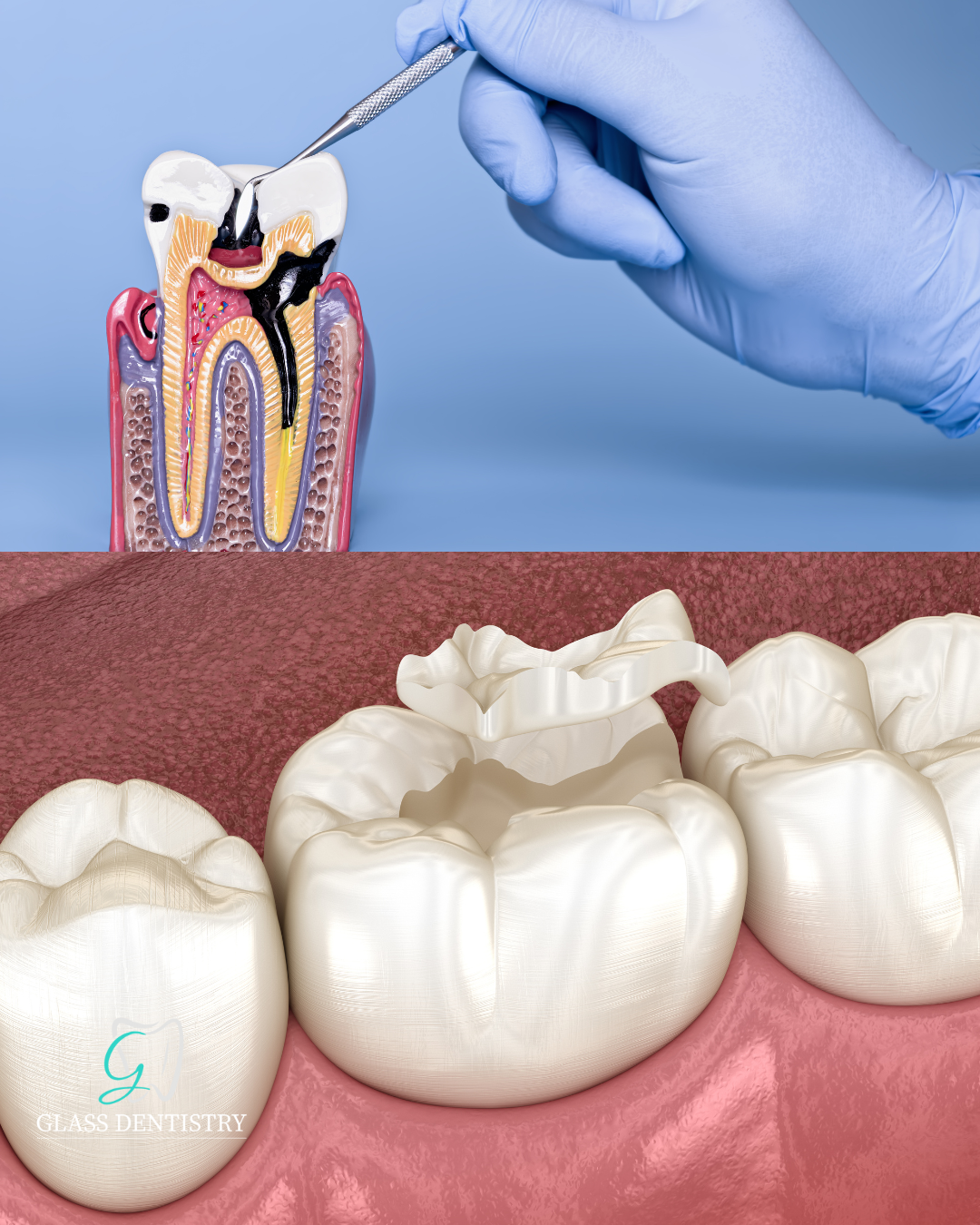
Written by Glass Dentistry - Follow us: Facebook and Instagram You brush twice a day, floss regularly, and think your dental routine is solid. But sometimes the damage doesn’t come from what you miss — it sneaks in through what you do. Here are 5 common habits damaging your teeth, why they hurt, and what you can do instead to protect your enamel, your gums, and your overall oral health. 1. Crunching Ice, Pens, or Other Hard Objects Habit description: biting ice, chewing on pens or pencil caps, crunching hard candy. These may seem harmless stress-relievers or boredom busters. Why it damages: hard, cold surfaces can cause micro-cracks in enamel or chip fillings/crowns. Over time, these tiny fractures grow worse. According to multiple dental sources, chewing on hard objects is one of the worst habits for tooth enamel. How to fix: replace the habit. Carry a stress ball, chew sugar-free gum, or choose softer snacks. If you crave crunch, try nuts or crisp apples instead of ice. 2. Brushing Too Hard or Using a Hard-Bristled Toothbrush Habit description: the idea that brushing aggressively equals cleaner teeth. Many people press too firmly, or pick brushes with stiff bristles. Why it damages: Too much force or hard bristles wear away your enamel and can cause gum recession. The enamel gets thinner, teeth may become sensitive, and gums bleed. The American Dental Association cautions against overbrushing. How to fix: Use a soft-bristled brush and gentle, circular motions. Let toothpaste do the cleaning, not your arm strength. Replace your toothbrush every 3–4 months or sooner if bristles splay. 3. Frequent Snacking or Sipping Sugary / Acidic Drinks Between Meals Habit description: having soda, fruit juice, or sweets all day, or sipping on soft drinks slowly over many hours. Why it damages: Each time sugar or acid hits your teeth, bacteria in plaque produce acids that erode enamel. The more frequently this happens, the less time saliva has to neutralize acid. Sources like the Oral Health Foundation warn about acid erosion from frequent exposure. Dentalhealthmd.com How to fix: limit sugary or acidic drinks to mealtimes. When you do indulge, rinse with water or chew sugar-free gum afterward to help raise mouth pH. Consider using a straw (where possible) to reduce contact with teeth. 4. Teeth Grinding / Clenching (Bruxism) Habit description: clenching jaw, grinding teeth while asleep or under stress. You may wake up with jaw pain or tooth sensitivity. Why it damages: Grinding wears down enamel, flattens biting surfaces, causes chips, cracks, and can lead to TMJ pain. It often goes unnoticed until damage has accumulated. WebMD and other dental experts highlight bruxism as a “teeth wrecking habit. WebMD How to fix: Talk to your dentist about a custom night guard. Practice stress reduction (e.g. meditation, jaw massage). Be aware of when you clench during the day and try to relax the jaw. 5. Avoiding Dental Checkups & Skipping Proper Cleanings Habit description: delaying or skipping routine dental exams, cleanings, or ignoring minor tooth or gum issues because they seem small. Why it damages: Plaque that isn’t removed hardens into tartar, which can cause gums to recede, lead to periodontal (gum) disease, and even bone loss. Early decay or cracks may worsen unnoticed. The National Institute of Dental and Craniofacial Research (NIDCR) emphasizes that good oral health practices include regular checkups. Mayo Clinic How to fix: Schedule dental cleanings at least twice a year (or more if advised). Don’t wait for pain — early intervention is far simpler, cheaper, and less invasive than fixing big problems later. Other Hidden Habits You Might Not Notice Using your teeth as tools (e.g. to open packages). Nail biting or even finger sucking (in adults or children). Adding lemon or citrus flavor to everything — acids are sneaky! Tobacco use and how it stains, reduces saliva, raises risk of gum disease and oral cancer. MD Periodontics Conclusion Your mouth works hard every day — chewing, talking, smiling, all while battling bacteria, acids, and wear. Many habits that seem harmless are quietly taking a toll on your teeth and gums. The good news? You can stop the damage before it becomes serious. By replacing just one or two of these habits, like switching to a soft toothbrush, cutting back on sugary sips, or getting that night guard — your enamel stays stronger, your gums stay healthier, and your smile stays beautiful. Want help spotting which habit is hurting your teeth? Glass Dentistry is here for you — let’s examine your routine together and protect your smile for years to come. 📍 Want more tips on protecting your smile? Visit Glass Dentistry or schedule your next cleaning today! Follow us: Facebook and Instagram
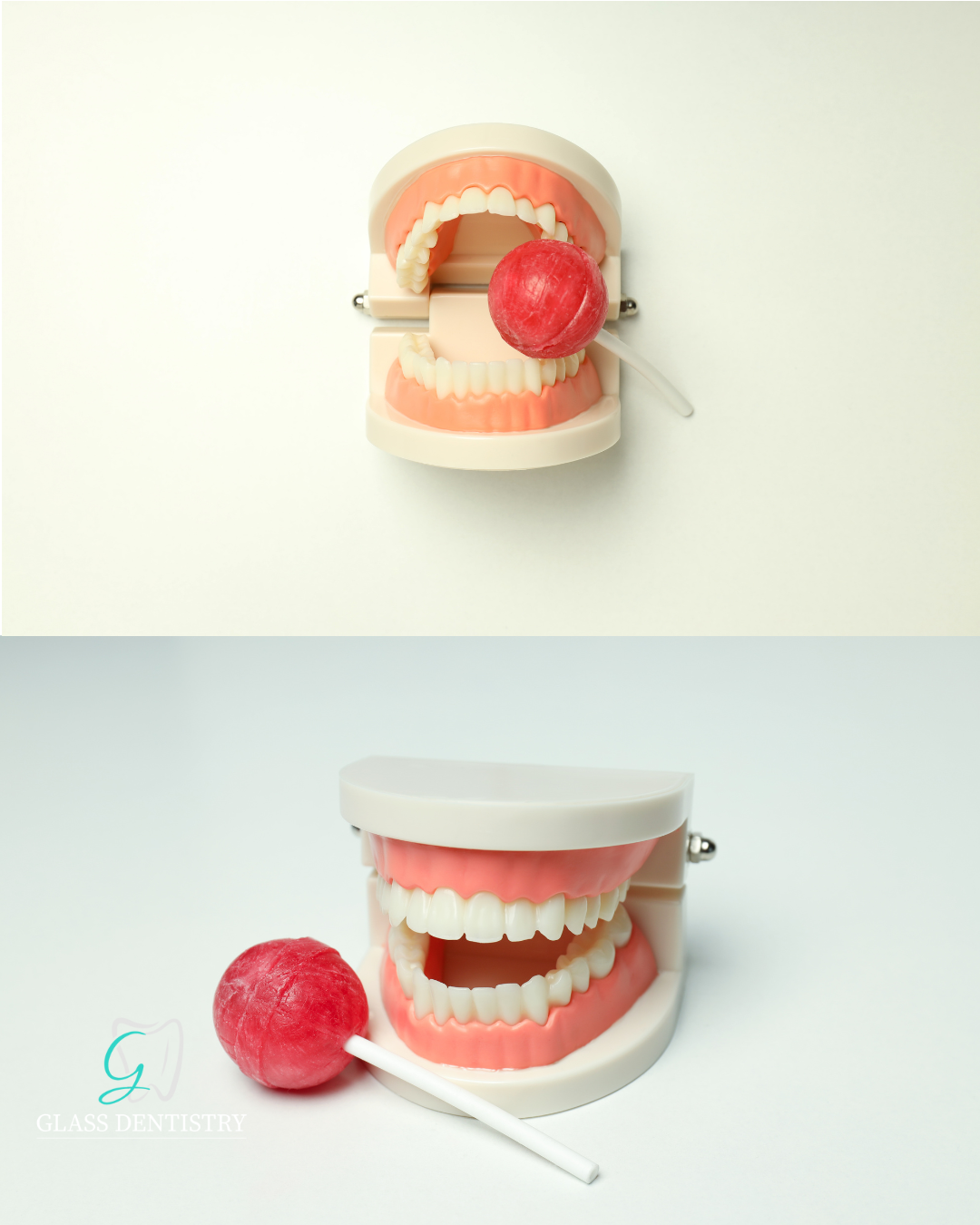
Introduction We all know candy and soda aren’t the best for our teeth, but did you know some “healthy” foods can also cause dental problems? Your daily snacks and meals might be contributing to enamel erosion, cavities, and staining without you realizing it. In this blog, we’ll break down six everyday foods that are surprisingly bad for your teeth, why they cause problems, and how you can protect your smile while still enjoying them. 1. Citrus Fr uits Citrus fruits like oranges, lemons, and grapefruits are packed with vitamin C, but they’re also highly acidic. Acidic foods can erode enamel, making teeth more sensitive. Over time, weakened enamel increases the risk of cavities. Drinking lemon water daily? That constant acid exposure can wear your smile down. 👉 Instead of cutting them out, rinse your mouth with water after eating citrus. Don’t brush right away—wait at least 30 minutes so enamel can recover. Learn more about acid erosion from Colgate. 2. Dried Fruits Dried fruits sound like a healthy snack, but they’re sticky and high in sugar. Raisins, apricots, and figs cling to teeth, creating the perfect environment for bacteria. Their concentrated sugars break down into acid, leading to tooth decay. 👉 If you love dried fruit, eat it with a meal instead of snacking alone, and always brush and floss afterward. 3. Crackers and Starchy Snacks Simple carbs like crackers, white bread, and chips might not seem sugary, but they quickly turn into sugar in your mouth. Starches get stuck between teeth and can linger for hours. The bacteria that cause cavities feed on these carbs. 👉 Swap refined carbs for whole-grain options and rinse with water to reduce food buildup. 4. Sports Drinks Many people think sports drinks are a healthier choice than soda, but they’re loaded with sugar and acid. T hey can be just as damaging as soft drinks when consumed regularly. The combination of sugar + acid = enamel erosion and cavity risk. 👉 If you need hydration, stick to water or sugar-free electrolyte drinks. Check out the ADA’s guide on sugary drinks. 5. Tomato-Based Foods Pizza, pasta sauce, and ketchup are delicious but also highly acidic. Acid from tomatoes can weaken enamel. Pair that with starchy pasta or bread, and you’ve got a double hit of cavity risk. 👉 Try balancing tomato-heavy meals with cheese or leafy greens to neutralize some of the acid. 6. Coffee and Tea Your morning cup might be waking you up, but it’s also staining your teeth. Coffee and tea contain tannins that discolor enamel. Adding sugar or flavored syrups makes them even worse for cavities. 👉 Consider drinking through a straw, rinsing with water, or switching to lighter teas. Here’s how coffee affects your smile (Cleveland Clinic). How to Protect Your Teeth While Enjoying These Foods You don’t need to give up your favorite meals and drinks completely. Small changes can go a long way in keeping your teeth strong and healthy: Rinse with water after acidic foods. Brush twice a day with fluoride toothpaste. Floss daily to remove sticky particles. Limit snacking—especially on sugary or starchy foods. See your dentist for regular checkups and cleanings. Conclusion Your diet has a bigger impact on your dental health than you may realize. Citrus fruits, dried fruit, crackers, sports drinks, tomato-based foods, and coffee or tea can all weaken enamel, cause cavities, or stain your smile. But with smart habits and regular dental care, you can enjoy these foods without harming your teeth. 📍 Want more tips on protecting your smile? Visit Glass Dentistry or schedule your next cleaning today! Follow us: Facebook and Instagram
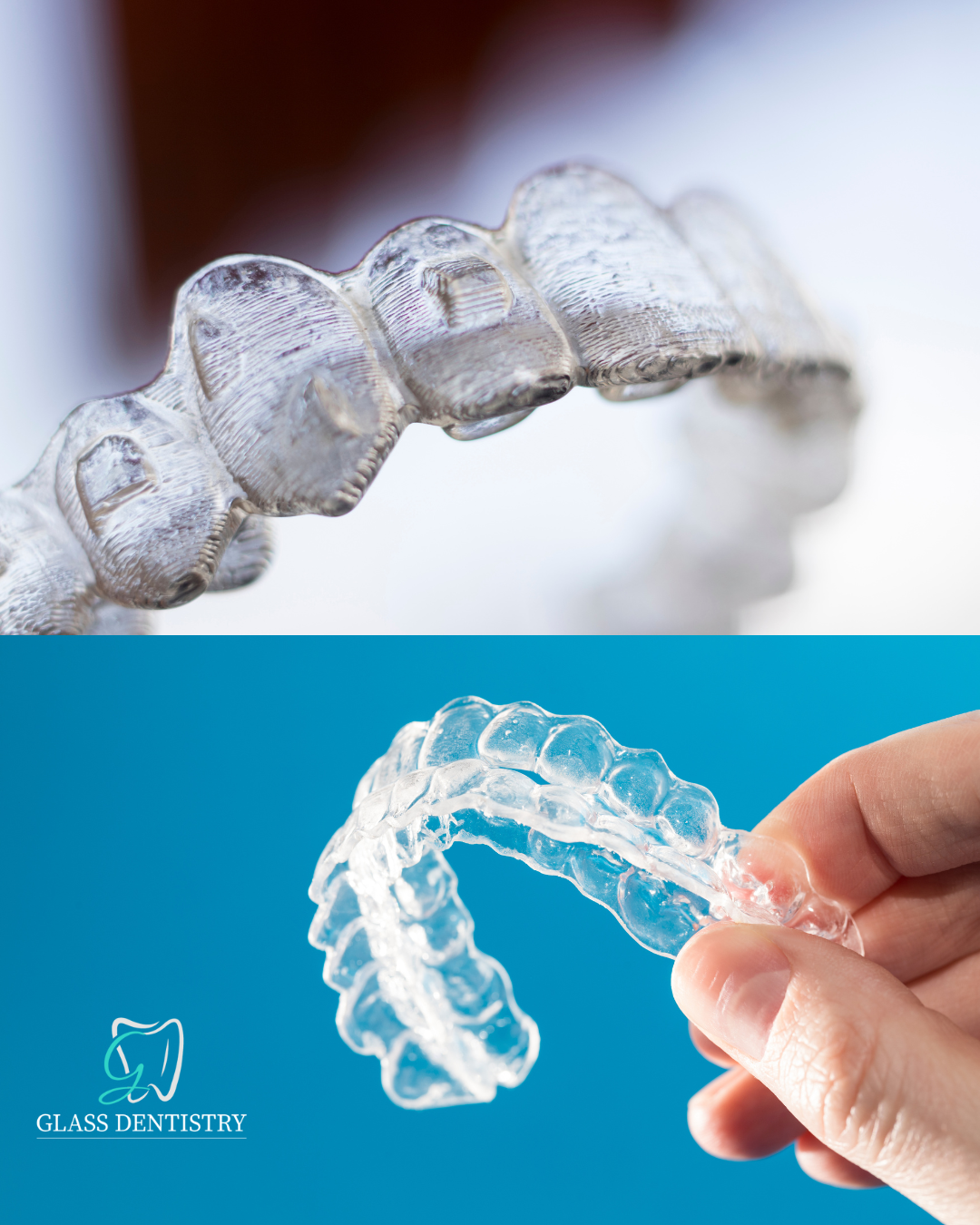
Written by Glass Dentistry - Follow us: Facebook and Instagram Your Clear Guide to a Straighter, Healthier Smile If you’ve been scrolling through social media lately, chances are you’ve seen ads for clear dental aligners. They promise a straighter smile without the metal brackets, wires, or endless trips to the orthodontist. But do dental aligners really work, and are they the right choice for you? Let’s break it down in simple terms so you can decide with confidence. What Are Dental Aligners? Dental aligners are thin, clear, custom-made trays that fit snugly over your teeth. They work by applying gentle, consistent pressure, slowly shifting your teeth into a better position. Each set of aligners is slightly different, and you’ll switch to a new pair every 1–2 weeks until your treatment is complete. Key Benefits of Clear Aligners: Nearly invisible – great for people who want a discreet look Removable – makes eating and brushing easy More comfortable than traditional braces No food restrictions (popcorn lovers rejoice!) H ow Dental Aligners Work Step-by-Step 1. Initial Consultation – A dentist or orthodontist examines your teeth and creates a digital scan. 2. Custom Plan – Your treatment plan is tailored to your exact dental needs. 3. Aligner Creation – A series of aligners is made, each one slightly adjusting your teeth. 4. Wearing the Aligners – You’ll wear them 20–22 hours a day for best results. 5. Progress Checks – Periodic check-ins ensure your teeth are moving as planned. 6. Final Touches – At the end, you might use a retainer to keep your new smile in place. 📌 Learn more about the process from the American Association of Orthodontists . Do They Really Work? The short answer: Yes, dental aligners work very well for most people—especially for mild to moderate misalignment issues like: Crowded teeth Gaps between teeth Overbites, underbites, or crossbites According to Orono Dental Care , results depend heavily on your commitment. If you follow the wear schedule and care instructions, you can expect noticeable improvements—sometimes in as little as a few months. Who Are Dental Aligners Best For? Dental aligners aren’t a one-size-fits-all solution. They’re ideal if you: Have mild to moderate orthodontic issues Want a removable option for eating and cleaning Can commit to wearing them 20–22 hours daily Prefer a less noticeable alternative to braces If you have severe misalignment, impacted teeth, or major bite issues, traditional braces might be the better choice. Your dentist or orthodontist can guide you toward the right treatment. Clear Aligners vs. Braces: Quick Comparison F eature Clear Aligners Traditional Braces Appearance Nearly invisible Metal or ceramic brackets Comfort Smooth, no wires Brackets/wires can cause irritation Eating Remove to eat anything Avoid sticky, hard foods Cleaning Remove to brush/floss easily More challenging to clean around Check-ups Less frequent More frequent adjustments Tips for Getting the Best Results Wear Them as Directed – Consistency is key. Keep Them Clean – Rinse daily and brush gently to prevent bacteria buildup. Avoid Staining Foods – Coffee, tea, and red wine can discolor aligners. Store Properly – Use your case to prevent damage or loss. Follow-Up – Attend check-ins to ensure your progress stays on track. Realistic Expectations While aligners can give you amazing results, they’re not an instant fix. Most treatments last 6 to 18 months depending on your case. Patience and commitment are the real secret ingredients to a perfect smile. It’s also important to remember that at the end of treatment, a retainer will help keep your teeth in place—otherwise they may shift back over time. The Cost Factor Clear aligners generally cost between $3,000 and $7,000 depending on: The complexity of your dental needs The provider you choose The brand of aligners (Invisalign, ClearCorrect, etc.) Some dental insurance plans will cover part of the cost—especially if the treatment is considered medically necessary. It’s worth checking with your provider. Why Clear Aligners Are So Popular Confidence Boost – They help you feel good about your smile during and after treatment. Flexibility – You can remove them for special events. Hygiene – Easier to keep your teeth and gums healthy. Technology-Driven – Digital scans and 3D imaging make for precise, predictable results. Possible Drawbacks to Consider While aligners are great, they’re not perfect for everyone: Must be worn most of the day Can be lost or damaged if not stored properly May cause slight discomfort when switching to a new set Not suitable for severe dental issues Conclusion: Are Clear Aligners Worth It? For many people, clear dental aligners are absolutely worth it. They’re effective, discreet, and offer the flexibility that traditional braces can’t match. Just remember—your results will only be as good as your commitment. Wear them consistently, care for them properly, and you’ll be on your way to a straighter, healthier smile. If you’re ready to see whether dental aligners could work for you, schedule a consultation with your Dr. Glass. Your perfect smile might be closer than you think! 📍 Thinking About clear aligners? Contact us today to schedule your consultation and learn more about how clear aligners can enhance your smile. Visit Glass Dentistry or call us at 205-755-1111 to get started! Please visit Glass Dentistry or Follow us: Facebook and Instagram
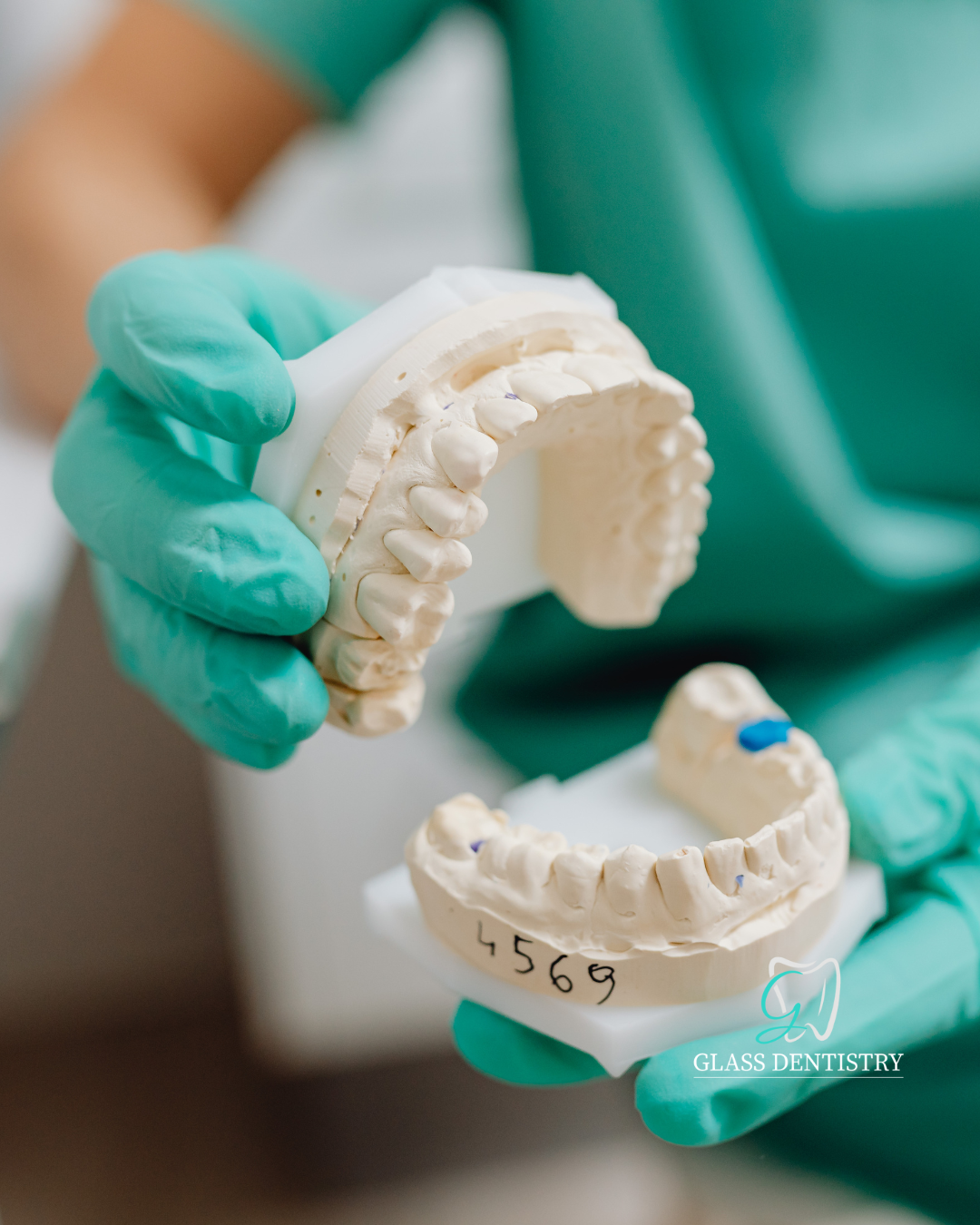
How to Check If Your Dental Plan Covers Cosmetic Treatments When considering a brighter, straighter, or more uniform smile, many people wonder: Does dental insurance cover cosmetic dentistry? The answer isn’t always straightforward. While dental insurance is designed to protect your oral health, it often falls short when it comes to elective or aesthetic procedures. In this blog, we’ll break down what you need to know about insurance coverage for cosmetic dental work, highlight key procedures, and offer tips on maximizing your benefits. Why Most Insurance Plans Don’t Cover Cosmetic Dentistry Most dental insurance policies do not cover cosmetic procedures because they are classified as elective. Insurance companies typically focus on preventive care, diagnostics, and medically necessary restorative treatments. Insurance Covers the Basics: 1. Routine cleanings and exams 2. X-rays 3. Fillings 4. Root canals 5. Extractions 6.Crowns and bridges (when medically necessary) Since cosmetic treatments are not essential for oral health, they fall outside standard coverage. For example, some insurances clearly state that procedures like teeth whitening or veneers aren’t included in most plans. Exceptions: When Cosmetic Dentistry Might Be Covered There are some gray areas where cosmetic procedures can be covered if they also serve a restorative purpose. Example Scenarios: • Dental crowns: If you need a crown after a root canal, it’s covered, even though it improves appearance. • Orthodontics: Some insurance plans cover braces or clear aligners if treatment is necessary for bite correction. • Tooth bonding: If used to repair a chipped or broken tooth due to an accident, it may qualify. Premium Plans That Offer Cosmetic Coverage Some higher-tier dental insurance plans may offer limited cosmetic benefits. These are usually more expensive but may provide partial coverage for: • Teeth whitening • Veneers • Clear aligners For example, some insurance plans include cosmetic procedures as optional riders or part of a premium policy tier. Before signing up, make sure to: • Read the plan details carefully • Ask if cosmetic coverage is included • Confirm annual maximums and deductibles Tips to Help Pay for Cosmetic Dentistry If your dental insurance doesn’t cover your desired cosmetic procedure, there are still ways to manage the cost. 1. Flexible Spending Accounts (FSAs) or Health Savings Accounts (HSAs): These accounts allow you to use pre-tax dollars for medical and dental expenses. Some cosmetic procedures may qualify. 2. Third-party financing: Companies like CareCredit or LendingClub offer monthly payment plans for cosmetic dental work. 3. Bundled treatments: Combining procedures can sometimes reduce costs and may help justify partial insurance coverage. Questions to Ask Your Insurance Provider Before proceeding with any cosmetic dental procedure, ask your insurance provider: • Is the procedure medically necessary or purely cosmetic? • Will any portion be covered? • What is my annual maximum? • Are there waiting periods for certain treatments? • Do you offer any cosmetic riders or premium plans? Get the answers in writing to avoid unexpected costs. Final Thoughts: Does Dental Insurance Cover Cosmetic Dentistry? In general, dental insurance does not cover purely cosmetic procedures. However, if the treatment serves a medical or restorative purpose, there’s a chance some costs could be reimbursed. Always check with your provider and ask about high-tier plans that may include cosmetic options. Summary Checklist: Want to learn more? Visit Glass Dentistry for expert guidance. Get Clarity Before You Commit While a stunning smile is always worth the investment, knowing what your insurance will and won't cover helps you plan smart. Be proactive—review your policy, talk to your dentist, and explore all available options before starting any cosmetic dental treatment. Contact us today to schedule your consultation and learn more about how our services can enhance your smile. Visit Glass Dentistry or call us at 205-755-1111 to get started! Please visit Glass Dentistry or Follow us: Facebook and Instagram
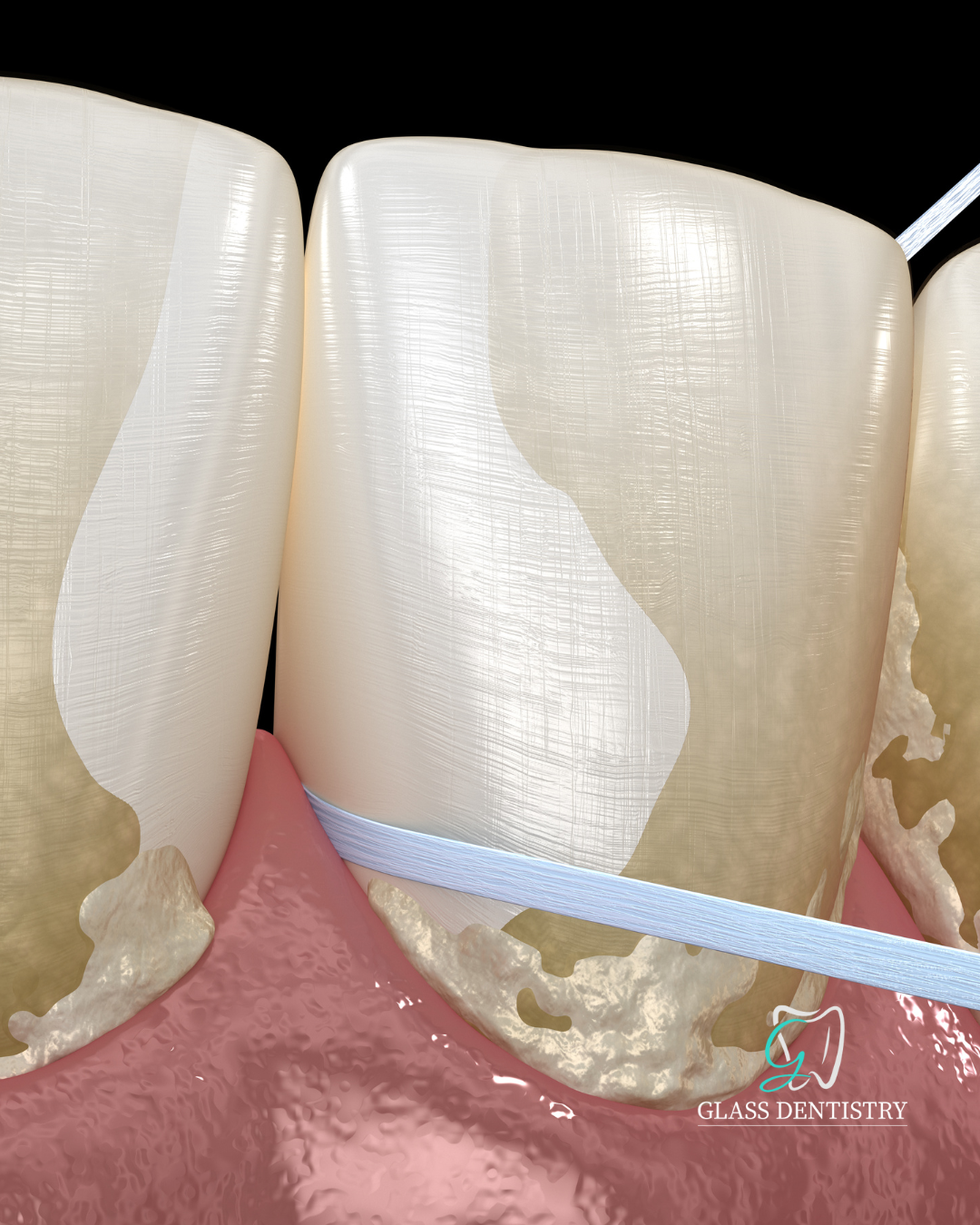
What Exactly Is Plaque? Let’s keep it simple. Dental plaque is a soft, sticky film that builds up on your teeth every single day . It’s made up of bacteria, bits of food, and saliva. Every time you eat or drink — especially sugary or starchy foods — you’re feeding the bacteria in your mouth. They love to snack just like you do! When these bacteria break down those food particles, they create acids. Over time, those acids can wear down your enamel , leading to cavities and irritated gums. Want help preventing plaque? Learn about our dental cleanings here . How Does Tartar Come Into the Picture? Here’s where things get a bit tougher — literally. If you let plaque hang around too long, it hardens into tartar, also called calculus. This usually happens when plaque isn’t cleaned off within about 24 to 72 hours . Unlike soft plaque, tartar is rock-hard and sticks firmly to your teeth, even under your gumline. Once tartar forms, you can’t just brush it away. It needs to be removed by your dental team with special tools at Glass Dentistry. Plaque vs Tartar: The Key Differences To make it super clear, here’s a quick side-by-side: Plaque: Soft and colorless (or pale yellow) Forms daily on teeth and gums Removed by brushing and flossing Tartar: Hardened plaque (like cement) Often yellow or brown Only removed with a professional dental cleaning Why Should You Care About Plaque and Tartar? Both plaque and tartar can cause big problems if ignored. It’s not just about having a bright smile. Here’s what can happen: Cavities: Plaque bacteria produce acid that eats away at your enamel, causing tooth decay. Gum disease: Plaque and tartar irritate your gums, leading to gingivitis and possibly periodontitis. Bad breath: The bacteria living in plaque and tartar produce foul odors. Stained teeth: Tartar can turn your teeth yellow or brown, making them look dirty even if they’re healthy underneath. Glass Dentistry is here to help you stop these problems before they start. How to Keep Plaque Under Control The good news? You can prevent tartar by stopping plaque from building up in the first place. Here’s how to keep your mouth healthy and clean: ✅ Brush twice a day. Use a fluoride toothpaste and gentle circular motions. Make sure to reach your back teeth and along the gumline. ✅ Floss daily. Floss gets where your toothbrush can’t — between teeth and just below the gums. ✅ Use mouthwash. An antibacterial rinse can help reduce bacteria that cause plaque. ✅ Watch your diet. Limit sugary and starchy snacks. Drink water after meals to help rinse away particles. ✅ Chew sugar-free gum. It boosts saliva, which naturally cleans your mouth. Need personalized tips? Contact Glass Dentistry to learn more. Why Regular Dental Visits Matter Even if you’re brushing and flossing like a pro, you can’t remove tartar once it’s there. That’s why your dentist and hygienist are so important for deep cleaning . During a professional cleaning at Glass Dentistry, we use special tools to gently remove tartar from your teeth and under your gums. This keeps your mouth healthy and helps prevent gum disease later on. Most people should come in every six months, but if you’re prone to tartar buildup or have gum issues, we might recommend more frequent visits. Signs You Might Have Plaque or Tartar Problems Keep an eye (and nose) out for these clues that it’s time for a cleaning: Gums that bleed when you brush or floss Persistent bad breath Teeth that look yellow near the gumline A rough or fuzzy feeling when you run your tongue over your teeth If you notice even one of these, it’s best to get checked out at Glass Dentistry . Conclusion : Stay Ahead of the Game When it comes to plaque vs tartar , the bottom line is simple: 👉 Plaque is the daily battle you fight at home. Tartar is what happens if you let it win. By brushing, flossing, and visiting Glass Dentistry regularly, you’ll keep your teeth and gums clean, healthy, and smiling bright for years to come. ✅ Ready to keep your smile in top shape? Contact Glass Dentistry today and enjoy the peace of mind that comes with a truly healthy mouth. Need More Info? Follow us: Facebook and Instagram. Contact us today to schedule your consultation and learn more about how our services can enhance your smile. Visit Glass Dentistry or call us at 205-755-1111 to get started!

Written by Glass Dentistry - Follow us: Facebook and Instagram Teeth whitening is one of the most requested cosmetic dental treatments today. Everyone wants a brighter smile, but not everyone is an ideal candidate for whitening products or procedures. If you're thinking about whitening your teeth, it's important to know that some people should avoid teeth whitening altogether — or at least talk to their dentist before moving forward. ⚠️ Why Teeth Whitening Isn’t for Everyone Most over-the-counter (OTC) whitening kits and even in-office procedures use hydrogen peroxide or carbamide peroxide, which break down stains but can also irritate teeth and gums if not used properly. According to the American Dental Association (ADA), teeth whitening is generally safe—but not for everyone. Here’s who should avoid teeth whitening treatments: 1. People With Untreated Dental Issues If you have cavities, gum disease, or cracked teeth, whitening agents can seep into damaged areas and cause: Increased tooth sensitivity Burning or stinging of the gums Prolonged discomfort 👉 Always get a dental exam before whitening to treat any underlying problems. 2. Those With Extremely Sensitive Teeth Some people naturally have more sensitive teeth than others. Whitening products, especially at high concentrations, can make this worse. You might feel: Sharp pain when consuming hot or cold drinks Lingering discomfort after treatments Irritation in your gums If you’re prone to sensitivity, discuss gentle whitening alternatives with your dentist or try sensitivity toothpaste first. 3. People With Restorations (Fillings, Crowns, Veneers) Whitening treatments won’t work on materials like: Porcelain crowns Veneers Composite fillings This can lead to uneven whitening, with natural teeth appearing whiter than the surrounding restorations. According to Mayo Clinic, it’s best to whiten before getting restorations or plan for replacements to match the new shade. 4. Pregnant or Breastfeeding Women Although whitening is considered safe for many adults, it's not recommended during pregnancy or while nursing . There's limited research on how whitening agents affect developing babies. Out of caution, the ADA and many dental professionals suggest waiting until after pregnancy or breastfeeding to begin any whitening procedures. 5. Children Under 16 Children and teens are still developing their teeth and gums. Whitening during this time can: Damage tooth enamel Irritate young gums Lead to long-term sensitivity Most dentists advise waiting until after the age of 16 — and only under professional guidance. 6. People With Allergies to Whitening Ingredients Whitening gels and strips usually contain peroxide. If you're allergic or sensitive to these ingredients, you may experience: Burning sensations Swelling Rash-like reactions Stop use immediately and consult your dentist if any symptoms appear. 7. People With Unrealistic Expectations Some individuals believe whitening can give them perfect “celebrity” smiles, but that’s not always possible. Whitening: Doesn’t change natural tooth color drastically Won’t fix crooked or damaged teeth Can only lighten stains, not remove all of them Set realistic goals. Your dentist can help guide your expectations based on your natural enamel shade. Glass Dentistry ✔️ Safe Alternatives for a Brighter Smile If you're not a good candidate for teeth whitening, consider these alternatives: Dental cleaning: Removes surface stains caused by coffee, tea, and smoking. Tooth-colored veneers : Can enhance shape and color with long-lasting results. Whitening toothpaste : Gently removes stains over time without strong chemicals. Lifestyle changes : Cutting back on staining foods and drinks can naturally preserve your smile. Learn more about safe cosmetic options by consulting with your dentist. Glass Dentistry 💬 Conclusion : Talk to Your Dentist First Teeth whitening isn’t one-size-fits-all. If you fall into one of the categories above, whitening could do more harm than good. But that doesn’t mean you can’t have a bright, healthy smile. The best first step? Talk to your dentist. They can help you explore safe alternatives and build a smile plan that fits your needs. 📍 Thinking About Whitening Your Teeth? Contact us today to schedule your consultation and learn more about how teeth whitening services can enhance your smile. Visit Glass Dentistry or call us at 205-755-1111 to get started! Please visit Glass Dentistry or Follow us: Facebook and Instagram

If you're searching for a "dentist office open near me," you're likely facing a dental concern that needs prompt attention. At Glass Dentistry, we understand the urgency and are here to provide immediate, compassionate care to the community. Why Choose Glass Dentistry? Dr. Sharon New Glass, DMD, brings over 30 years of experience in the dental field, offering a blend of expertise and personalized care. Here's what sets us apart:glassdentistry.com+1glassdentistry.com+1 Comprehensive Services: From implant crowns to teeth whitening, root canals, and extractions, we cater to a wide range of dental needs. Family-Friendly Care : We welcome patients starting at age 3, ensuring dental health for the entire family. Insurance Assistance : Our team handles insurance paperwork, making your visit hassle-free. Modern Facilities : Equipped with state-of-the-art technology to provide quality treatments. Convenient Location : Located at 105 Medical Center Drive, Clanton, AL 35045. Services We Offer At Glass Dentistry, we provide a range of services to meet your dental needs: 1. Cosmetic Dentistry Enhance your smile with our cosmetic treatments: Veneers Crowns and Bridges Implant Crowns Teeth Whitening Tooth-Colored Crowns Custom Bleaching Chipped Tooth Bonding Porcelain Crowns Onlays and Inlays findadentist.ada.org 2. Family Dentistry We provide comprehensive dental care for all ages, ensuring your family's oral health is in good hands. 3. General Dental Services From routine check-ups to more complex procedures, our services include: Dry Mouth Treatments X-Rays Collaborations with local oral surgeons and orthodontists for specialized care glassdentistry.com What to Do in a Dental Emergency If you're experiencing a dental emergency, here's what you can do before reaching our office: Toothache: Rinse your mouth with warm water and use dental floss to remove any food debris. Chipped or Broken Tooth: Save any pieces, rinse your mouth, and apply a cold compress to reduce swelling. Knocked-Out Tooth: Keep the tooth moist, ideally in milk, and seek immediate dental attention. Lost Filling or Crown: Apply a piece of sugarless gum to the area and contact us promptly. Preventive Tips for Oral Health Maintaining good oral hygiene can prevent many dental issues: Brush Twice Daily : Use fluoride toothpaste to strengthen enamel. Floss Daily : Remove plaque between teeth. Regular Dental Check-Ups : Schedule visits every six months. Limit Sugary Foods : Reduce the risk of cavities. Wear Mouthguards : Protect teeth during sports activities.findadentist.ada.org+2Sharecare+2Healthgrades+2 Frequently Asked Questions Q: Do you accept new patients? A: Yes, we welcome new patients starting at age 3.glassdentistry.com Q: What insurance plans do you accept? A: We file insurance for our patients; please contact us to verify your specific plan. Q: How can I schedule an appointment? Call us at (205) 755-1111 or visit our website to request an appointment. Cosmetic Dentistry Contact Us Glass Dentistry 📍 105 Medical Center Drive, Clanton, AL 35045 📞 (205) 755-1111 🌐 www.glassdentistry.com Our office is equipped with free Wi-Fi and a comfortable waiting area to make your visit pleasant. glassdentistry.com At Glass Dentistry, we're committed to providing exceptional dental care tailored to your needs. Whether you're facing a dental emergency or seeking routine care, our experienced team is here to help. Contact us today to schedule your appointment and experience the difference.

Written by Glass Dentistry - Follow us : Facebook and Instagram Dental emergencies with kids can happen anytime—during playtime, sports, or even at bedtime. Whether it's a sudden toothache, a chipped tooth, or swollen gums, knowing where to go and how to react can make all the difference. While true 24/7 pediatric dental offices are rare, many practices offer same-day or after-hours emergency care to help your child get relief fast. Here’s a helpful guide to finding emergency pediatric dental care near you , including how to manage the situation and which offices to call. 1. Local Family Dentistry Offices Often Offer Emergency Care While not all family dentists specialize in pediatrics, many general dental offices do offer emergency services for children. If your child has a dental injury or sudden pain, your local family dentist may be your quickest option for care. They can often help with: Chipped or broken teeth Toothaches or abscesses Oral injuries and bleeding Swelling or infection Look for a dentist near you that advertises emergency services, or check their website for after-hours instructions. Many will see patients on short notice or direct you to urgent care dental clinics if needed. 2. Pediatric Dentists That Offer Emergency Services Pediatric dentists are trained specifically to treat children and are usually more equipped to handle dental emergencies in a way that keeps kids calm and comfortable. Some of the services they may offer include: Same-day emergency appointments Knocked-out baby or permanent teeth care Treatment for dental trauma from accidents Emergency fillings or temporary fixes Here are examples of what to look for in pediatric dental offices that provide emergency care: Offices that advertise after-hours care Staff trained to work with anxious children Online booking or emergency contact options Kid-friendly environments that reduce stress during visits If you're not sure where to find one, searching for "pediatric emergency dentist near me" is a good place to start. 3. What If You Need 24-Hour Dental Care? True 24/7 pediatric dental offices are uncommon, but that doesn’t mean you're out of options. If your child experiences a dental emergency outside of normal office hours, consider: Dental urgent care centers – Many cities have dental-specific urgent care clinics that take walk-ins or emergency calls. Hospital emergency rooms – For serious oral injuries or swelling that affects breathing, head to the ER right away. These places may not always provide full treatment, but they can stabilize the issue until a pediatric dentist is available. 4. What to Do at Home Before the Appointment If your child is in pain and you’re waiting to be seen, here are some simple steps you can take: Toothache: Rinse with warm salt water, use a cold compress on the outside of the cheek, and give children's pain relief (not aspirin). Knocked-Out Tooth: If it’s a permanent tooth, place it in milk and get to the dentist ASAP. Avoid touching the root. Chipped/Broken Tooth: Save any broken pieces, rinse the mouth gently, and use gauze if there’s bleeding. Swelling/Abscess: Use a cold compress and call your dentist immediately. These may signal infection and should not wait. Having a small dental first aid kit at home can be helpful in situations like these. Conclusion : Be Ready Before the Emergency Happens Dental emergencies are stressful, but they don’t have to be overwhelming. Knowing where to go, who to call, and what to do ahead of time can save you a lot of panic and help your child feel better faster. Here’s how you can be prepared: Save the numbers of local pediatric dentists and urgent care dental centers in your phone . Bookmark helpful resources. Create a small dental first aid kit with gauze, gloves, and a tooth preservation container. Visit a dentist regularly so your child is already comfortable in case of an emergency . Need More Info? Follow us: Facebook and Instagram . Contact us today to schedule your consultation and learn more about how our services can enhance your smile. Visit Glass Dentistry or call us at 205-755-1111 to get started!

Share On: